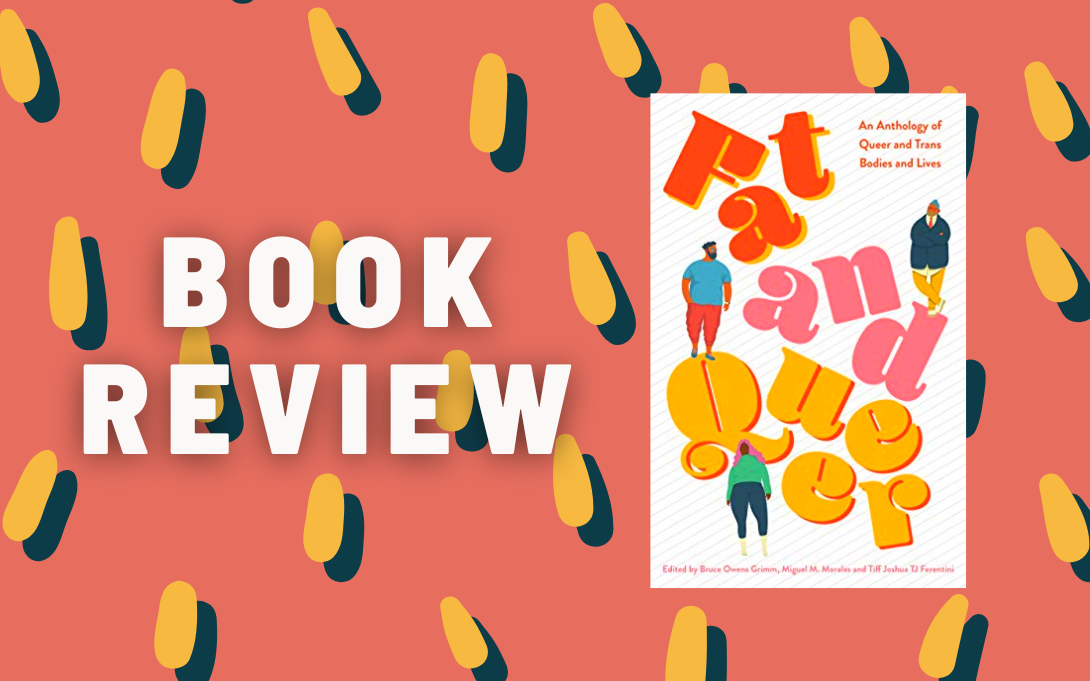By R.B. Brooks

I spotted this book at my local library and immediately snatched it from the new non-fiction section, genuinely surprised by two things: 1) that I had never heard of this book before and 2) that I was finding it at my smaller town library that typically (over)stocks its shelves with political non-fiction or books with lynching references in an attempt to reconcile Duluth's dark history.
This book itself is hard to miss– a white background with pops of warm colors forming the title font and three illustrated fat figures that are simultaneously quirky and cool. What lies inside are 40 essays, poems and prose pieces exploring a vast spectrum of experiences being fat and queer.
A theme that reveals itself early in the anthology is the era in which many of the pieces are written. Some of the references– the Terminator movie, certain TV shows, and quite a few anecdotes about being a child attending Weight Watchers– seem to date the stories. They read with a certain urgency, as though from older fat, queer folks who may be telling these stories for the first time, to anyone.
This magnanimity added a layer of vulnerability and intimacy that characterized all the pieces in this anthology in their own ways. Many narratives named family members as initial sources of shaming or commentary on their weight, oftentimes with even more rigor or vitriol than their queerness.
It made me wonder how many fat people create necessary distance from family because of fatphobia before coming into queerness to then never know what the response and receptivity to their gender or sexuality would be because they’ve already had to establish these strict boundaries. Though… for many of the authors in this collection, their queerness and fatness are so deeply intertwined that defending against adversity for their size, appearance or relationship with food cannot be separated from being ostracized for their attractions, sexuality or gender.
A significant strength of this collection is the visualizations created through wordplay. This is particularly compelling in a piece titled “Soft Butch” in which contributor Nora E. Derrington asserts that the words “soft” and “butch” are onomatopoeias (i.e. a word that describes what it sounds like). It makes the essay nearly interactive, encouraging readers to chew on the words more intentionally, flicking their tongues more emphatically– an amazing sensory experience for someone who loves to read out loud.
Other pieces hit on the limitations of language, such as Caleb Luna’s “The Gender Nonconformity of My Fatness” in which they talk about how their fatness “arrests” their gender, sharing anecdotes about interactions that were problematized by strangers’ assumptions of their gender and sexuality based on their body size and shape. This essay is full of existential questions such as “What of people whose fatness produces a body where otherwise presumably obvious secondary sex characteristics become more ambiguous? Whose bodies challenge a presumably clear and defined binary of dichotomous and easily definable bodies?” that position fatness as its own gendered position, undefinable and proprietary.
This anthology’s treatment of fat folks’ sexual activity is powerful. Fat folks are often desexualized, relegated to the bottom of the desirability ranks, only fucked when pitied or paying in money or favours. The essays dealing with sexual desire and behaviors may hold shame or rejection as a subtext, but overall cater to the prowess of fat folks fucking– especially fat folks fucking each other.
In this vein, Bruce Owens Grimm’s essays about gainers (“someone who derives erotic and/or sexual pleasure from the act of eating or gaining weight”) and encouragers (“someone who derives erotic or sexual satisfaction from participating in the growth of a gainer”) strikes dual chords– sensual and political. Stories about secrets shared between customer and barista are an erotic exposé on how fat people’s relationship with food is not a moral failing or lack of impulse control– that gorging and indulging are methodical, conscious acts. A clear message: fat people are in control of their bodies.
One nitpick about format– this anthology could have benefited from being compiled into sections based on core themes with a brief intro to each section provided by an editor or additional contributor. Without sections to break up the 40 essays and poems, it required a lot of mental shifting without just a little guidance and framing to take in smaller batches of content at a time.
Overall, this book is a radical reckoning, so much so that I was reluctant to return it to my library. It became a comfort to have in my possession, to recall snippets from a piece while doing a random task and feel affirmed that there’s someone else out there, whom I’ve not met save for their words on the pages, that has encountered something similar as this fat trans enby. The sentiments in this book stage fat queer and trans bodies and lives as testaments, artifacts, fodder, sacred texts and sites of wonder. I desperately hope there is a second anthology on the horizon, it’s much needed. And I would be happy to contribute– wink wink.